Our Work
Founded in 2014, the Center on Privacy & Technology is a leader at the intersection of privacy, surveillance, and civil rights.

Distinguished Fellow Gabrielle Rejouis Quoted In InformationWeek
June 2024: Distinguished Fellow Gabrielle Rejouis was quoted in InformationWeek article "What Is the Future of AI-Driven Employee Monitoring?” She raised concerns about how electronic monitoring can interfere with worker organizing.

Distinguished Fellow Gabrielle Rejouis Speaks at Outbraving Summit
June 2024: Distinguished Fellow Gabrielle Rejouis spoke on "Black Political Economy, Capital Racism and Technology (Economic & Legal)" panel at Outbraving Summit. On the panel, she spoke about why privacy and algorithmic accountability policies should not be separated. She also discussed why regulations for workplace technology should address the impact of surveillance rather than focus on the technology used.

Distinguished Fellow Gabrielle Rejouis Joins Data & Society's 2024 Affiliate Class
June 2024: Distinguished Fellow Gabrielle Rejouis was selected to join Data & Society's 2024 Affiliate class. She will continue collaborating with the Labor Futures program at Data & Society.

The Privacy Center Co-Hosts Annual Privacy Law Scholars Conference
May 2024: The Institute for Technology Law & Policy and the Center on Privacy & Technology co-hosted the annual Privacy Law Scholars Conference (PLSC) at Georgetown Law on May 30 and 31, 2024. PLSC is the premier academic conference of privacy, law, and technology scholars, researchers, and practitioners in the world. Over 250 people attended.

Telemundo Covers "Raiding the Genome"
May 2024: Telemundo covered our latest report findings from "Raiding the Genome: How the United States Government Is Abusing Its Immigration Powers to Amass DNA for Future Policing." in a video piece and featured an interview (in Spanish) with report co-author and Director of Research & Advocacy Stevie Glaberson.

LA Times Covers "Raiding the Genome"
May 2024: The LA Times covered our latest report findings from "Raiding the Genome: How the United States Government Is Abusing Its Immigration Powers to Amass DNA for Future Policing." In a front page article. Director of Research & Advocacy Stevie Glaberson was quoted "Even when people know what’s happening, they’re terrified to ask questions, they’re terrified to object, they’re terrified to refuse."

"Shadow Report to the US AI Policy Roadmap"
May 2024: The Center signed on to coalition report, along with 39 others, that aimed to combat the inaccurate way in which the Senate positioned their roadmap as a starting point for understanding AI concerns. The "Shadow Report to the US AI Policy Roadmap" points out that this process has eaten up a year of this legislative session to produce yet another roadmap that superficially namechecks issues, instead of actual progress towards enforceable law.

Director of Research & Advocacy Stevie Glaberson's Paper Published
May 2024: Director of Research & Advocacy Stevie Glaberson's academic paper, "The Epistemic Injustice of Algorithmic Family Policing", was published in the UC Irvine Law Review. The piece explores the ways that family policing’s turn to “big data” risk-prediction algorithms scales up and expands the system’s already pervasive epistemic injustice.

Watchword Prize Winner Announced
April 2024: The Center announced the winner of the inaugural Watchword Prize: “Watchman, What of the Night?” by author Michael Colonnese. The poem is posted on the Center's website and available to read. Poems were judged by acclaimed poet and Georgetown faculty Carolyn Forche.

"The Secret Life of Data" Book Talk
April 2024: The Center co-sponsored (with Georgetown Tech Law, hosted by Digital Ethics Georgetown) a book talk moderated by Professor Laura DeNardis about The Secret Life of Data by Jesse Gilbert and Aram Sinnreich. The authors and Professor DeNardis discussed data surveillance, digital forensics, and generative AI. The book explores the unpredictable ways in which data surveillance, AI, and the constant presence of algorithms impact our culture and society in the age of global networks. No matter what form and what purpose we think it's being used for, data will always have a secret life. The book was published in May 2024.

Fritz Fellow Simone Edwards Presents at Fritz Conference
April 2024: The Center's 2023-2024 Fritz Fellow Simone Edwards presented, along with Massive Data Institute team, at the annual Fritz Conference. Simone presented on her work as part of the Fritz team during the 2023-2024 school year. She discussed her work digesting documents disclosed in response to the Center's FOIA requests, as well as the strategic corporate research she undertook to find out more about the companies and individuals behind the technologies those documents revealed police departments to be buying, specifically probabilistic genotyping programs.

"New Tech, Old Story: How Understanding the History of Worker Surveillance Should Inform Policies and Regulation"
April 2024: In conjunction with Tech & Society Week 2024, the Center on Privacy & Technology co-hosted the “New Tech, Old Story: How Understanding the History of Worker Surveillance Should Inform Policies and Regulation” with United for Respect and the Athena Coalition. The panelists, EEOC General Counsel Karla Gilbride, founder and Executive Director of the Missouri Workers Center Jeremy Al-Haj, and the Center on Privacy and Technology’s Distinguished Fellow Gabrielle Rejouis, discussed how contemporary workplace surveillance policies are repeating patterns from the past. Each panelist outlined how worker surveillance has evolved from slavery to the post-pandemic workplace and how understanding this history can empower people to seek impactful change in workplace surveillance practices.

Executive Director Emily Tucker’s Article Translated and Republished
March 2024: Executive Director Emily Tucker’s article "Our Future Inside The Fifth Column - Or, What Chatbots Are Really For” was translated into Italian and published in the AI Aware magazine. In it, Tucker analyzes how major tech companies use chatbots and artificial intelligence as tools for marketing monopoly consolidation and political influence rather than for the common good. It also points out the media's lack of critical attention towards this and the dangers of corporate power accumulation. AI Aware aims to provide in-depth and accessible analysis on the ethical, social, and technical issues related to AI. The original piece, in English, was published on Tech Policy Press in June 2023.

Senior Associate Cynthia Khoo on The Signal with Adam Walsh
February 2024: Senior Associate Cynthia Khoo appeared on a radio show, The Signal with Adam Walsh, CBC Newfoundland and Labrador. She spoke on the civil rights implications of artificial intelligence, including bias and abuse embedded in how AI-based tools are developed and deployed. Cynthia also emphasized factors that regulators should keep in mind when assessing the potential benefits and harms of AI, including: who is disproportionately harmed; false advertising of AI hiding human workers; and avoiding technosolutionism. Her interview was played on air for comment by the NL Information and Privacy Commissioner.

Faculty Director David Vladeck Publishes Op-Ed in Baltimore Sun
January 2024: David Vladeck co-authored an op-ed in Baltimore Sun "You’re giving away your rights in those online contracts you don’t read" which argued that businesses are stripping away consumer rights through online contracts. The piece called on the CFPB to outlaw the use of unfair clauses in some consumer contracts.

Virtual Teach-In: Algorithmic Housing Discrimination in D.C.
December 2023: Senior Associate Cynthia Khoo, Director of Research and Advocacy Stevie Glaberson, and Justice Fellow Emerald Tse coordinated a virtual teach-in on algorithmic housing discrimination in DC. The teach-in featured speakers with legal and research expertise in or firsthand experiences of algorithmic housing discrimination, including: Natasha Duarte (Upturn); Susie McClannahan (Equal Rights Center); Troy and Monique Murphy (individual members of the Fair Budget Coalition), and Wanqian Zhang (3L at Georgetown Law and Student Attorney at the Communications and Technology Law Clinic).

Podcast Interview: Taking Action
December 2023: Senior Associate Cynthia Khoo spoke to Daniel del Pielago, Housing Director at Empower DC, for their podcast Taking Action, a one-hour radio show aired live every Tuesday at 1pm ET on WPFW 89.3 FM. She was interviewed alongside Ben Winters, Senior Counsel and lead of the AI and Human Rights Project at the Electronic Privacy Information Center (EPIC). Cynthia and Ben spoke about algorithmic housing discrimination, as well as algorithmic discrimination more broadly.

Response to President Biden's AI Executive Order
December 2023: The Privacy Center signed on to comments relating to OMB's guidance following the Biden AI EO. Comments were written by Just Futures Law, Surveillance Resistance Lab, UCLA Center on Race and Digital Justice, Mijente and Media Justice, many of whom have been and continue to be partners in Privacy Center efforts. The comments focused on the OMB guidance specifically as it relates to DHS and federal acquisition and use of AI impacting immigrant communities.

Tech Policy Press: Does ICE Data Surveillance Violate Human Rights Law? The Answer is Yes, and It's Not Even Close
November 2023: The Center’s Executive Director Emily Tucker and Clinical Fellow at the International Justice Clinic at UC Irvine Law co-authored a piece published in Tech Policy Press that highlights the United Nations Human Rights Committee's Concluding Observations that calls out how ICE’s surveillance practices conflict with human rights law and the right to privacy. Those observations echo our report co-written with the International Justice Clinic we submitted as part of their periodic review process.

Comments to the Department of Health and Human Services
November 2023: The Privacy Center co-authored with Upturn a comment to the US Department of Health and Human Services on a proposed update to the agency’s regulations implementing Section 504 of the Rehabilitation Act of 1973, arguing that the proposed rule is incomplete because it fails to address the sites in the system where most discrimination occurs: reporting, screening, and investigation. Our comment also highlights how agencies may use algorithmic and data-driven tools that contribute to disability discrimination and provides recommendations to address discrimination at the front end of the system.

Cited Report: The New Yorker
November 2023: The New Yorker published an in-depth piece on technology and policing that cites our report The Perpetual Line-Up and Laura Moy's 2021 law review article.
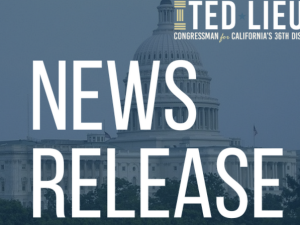
Statement: Support of the Facial Recognition Act of 2023
October 2023: Congress proposed a bill to regulate police use of face recognition. Executive Director Emily Tucker made a statement in support of the bill. "The Facial Recognition Act of 2023 takes a powerful stand against the spread of surveillance policing in the United States. As the movement to ban facial recognition builds across the country, Congressman Lieu's bill would set a solid federal floor to limit the harms of this corrupt technology in our communities. With a clear non-preemption statement, a private right of action, strong limits against integrating facial recognition with other surveillance databases and a prohibition on using facial recognition on protestors or for immigration enforcement, this legislation would make it more possible for people harmed by facial recognition to organize against it."
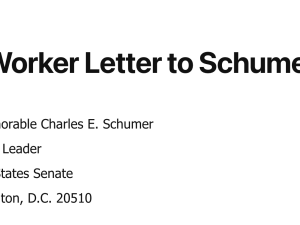
AI Worker Letter to Chuck Schumer
October 2023: The Center signed onto a joint letter alongside 23 workers' rights, civil rights, and other civil society organizations calling on Senate Majority Leader Chuck Schumer to center workers and protect their rights in his efforts to address advances in artificial intelligence, such as through his "AI Insight Forum" series, which have to date featured a disproportionate concentration of industry representatives compared to civil society, civil rights, or workers' rights representatives. The letter presents several recommendations and calls on Senator Schumer and Congress to "develop a new generation of economic policies and labor rights to prevent corporations like Amazon from leveraging tech-driven worker exploitation into profit and outcompeting rivals by taking the low road".
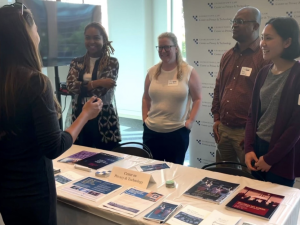
Georgetown Law Tech Institute Student Mixer
October 2023: Center on Privacy & Technology staff attended and presented at the Georgetown Law Tech Institute's student mixer on October 5th, 2023. The mixer allows law students to explore the different experiences and organizations available to them at the Law Center.

Submission to the United Nations Human Rights Committee
September 2023: The Center on Privacy & Technology and the International Justice Clinic at UC Irvine Law co-authored a report submitted to United Nations Human Rights Committee arguing that ICE’s dragnet surveillance practices amount to an egregious violation of human rights law, and of US obligations under the ICCPR, specifically under Article 17 which guarantees the right to privacy as a fundamental human right and requires that any state interference with privacy be proscribed by a specific, accessible law, necessary to pursue a legitimate purpose, and proportionate to that purpose. Our report prompted a Human Rights Committee member (Prof. Soh) to show his concern about ICE's dragnet surveillance and asked US delegates, essentially, how the US ensures ICE's practice complies with ICCPR and when the US will legislate federal data privacy law. The Committee’s Concluding Observations on the fifth periodic report of the United States of America explicitly calls out ICE for surveillance practices that conflict with human rights law. This adds international pressure on ICE to stop dragnet surveillance.

Op-Ed: It's family regulation, not a computer glitch
September 2023: Director of Research & Advocacy Stevie Glaberson recently published an op-ed, "It's family regulation, not a computer glitch," in the Arizona Daily Star. In the op-ed, Glaberson and her co-author Marshneil Lal write about the implications of the recent revelation by the Arizona Department of Child Safety that for two years, Arizona courts relied on a flawed computer system in as many as 3,800 cases to make decisions about whether Arizona should take children away from their parents. They write "This is not just a story about a data glitch. It’s a revealing story about the "surveillance tentacles" of the state’s “child welfare” system, the pervasive failure of the system to listen to the people it targets, and the ways adding a layer of technology magnifies the system’s harms."

No, We Don't Live In A F#%*ing Sumulation
August 2023: Executive Director Emily Tucker and philosopher David McNeill co-taught a virtual mini-course entitled No, We Don’t Live In A F%#*ing Simulation to 34 students exploring the simulation hypothesis, long-termism, and the imminent threat of artificial general intelligence (AGI). The course received 86 applicants coming from academia, government (globally), NGOs and non-profits (globally), law, social work, computer sciene, and private sector. The 34 students represented more than 12 countries. The Center on Privacy & Technology hopes to offer the course again.

Testimony in Support of S.27: An Act to Protect Private Electronic Communication, Browsing and Other Activity
July 2023: Justice Fellow Meg Foster and Director of Research & Advocacy Stevie Glaberson submitted written testimony to the Massachusetts Joint Committee on Advanced Information Technology, the Internet and Cybersecurity in support of S.27, An Act to protect private electronic communication, browsing and other activity. The bill establishes warrant and reporting requirements for electronic communication and subscriber records, as well as the use of cell site simulators. It also prohibits law enforcement from requesting, and judges from granting, reverse-location and reverse-keyword requests. The testimony focused on the disparate impact that the dragnet surveillance tools and techniques regulated in S.27 have on marginalized communities, including on their First Amendment rights.

Comments to the White House Office of Science and Technology Policy
June 2023: The Center signed onto joint comments spearheaded by the Athena Coalition, submitted to the White House Office of Science and Technology Policy's Request for Information on Automated Worker Surveillance and Management. The submission, which Senior Associate Cynthia Khoo (among others) reviewed and provided feedback on, focuses on the harmful impacts of ubiquitous surveillance and punitive automated management at Amazon on its warehouse workers and delivery drivers. The comments also include a number of recommendations to the Biden-Harris administration to implement in protecting workers from continued exploitation through automated surveillance and management.

The Intercept: LexisNexis Is Selling Personal Data to ICE
June 2023: Executive Director Emily Tucker was quoted in an article in The Intercept about ICE and LexisNexis contracts: “This is really concerning,” Emily Tucker, the executive director of Georgetown Law School’s Center on Privacy and Technology, told The Intercept. Tucker compared the contract to controversial and frequently biased predictive policing software, causing heightened alarm thanks to ICE’s use of license plate databases. “Imagine if whenever a cop used PredPol to generate a ‘hot list’ the software also generated a map of the most recent movements of any vehicle associated with each person on the hot list.”

Op-Ed: Chatbots Are Creating Algorithmic Dependence
June 2023: Executive Director Emily Tucker published an op-ed in Tech Policy Press entitled "Our Future Inside The Fifth Column- Or, What Chatbots Are Really For" about the corporate and capitalist goals of companies designing chatbots. Chatbots, Tucker warns, are part of a larger scheme to sow algorithmic dependence in the economic spaces most important to the public interest. “The goal is no longer to dominate crucial industries, but to convert crucial industries into owned intellectual property.”

Presentation at Labor Research & Action Network Workshop
June 2023: Distinguished Fellow Gabrielle Rejouis spoke at an LRAN workshop, "American History, Race, Prison, and Surveillance: Atlanta’s Cop City, Extractive Economies and Amazon’s Culture of Surveillance", presenting on the history of worker surveillance. Her presentation connected the history of surveillance to current Amazon surveillance of workers and their support of law enforcement surveillance of Black communities. The presentation drew from the research for the Color of Surveillance: Monitoring Poor and Working People.
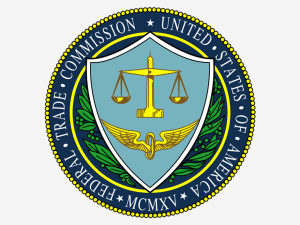
Letter to the FTC on Commercial Surveillance and Data Security Rulemaking
June 2023: The Center signed onto a joint letter alongside 40 civil rights and technology policy advocacy organizations calling on the Federal Trade Commission to define discrimination as an unfair practice and to require testing of algorithmic systems for discrimination, as part of the Commission's Commercial Surveillance and Data Security Rulemaking. The letter also provided several recommendations for the FTC to develop concrete and specific protections for civil rights.

Worker Surveillance Panel at RightsCon 2023
June 2023: Senior Associate Cynthia Khoo spoke on a panel at RightsCon 2023, titled, "Reclaiming and Building Worker Power in an Age of Workplace Surveillance." She joined representatives from Coworker.org, TEDIC Paraguay, and other privacy and technology policy professionals. Cynthia presented on how both privacy laws and employment / labour laws fail to protect workers from surveillance and data-driven harms, and what lawyers, other advocates, and decision-makers can do to address the issue.

Reason: TSA's Facial Recognition Tech Raises Questions About Bias and Data Security
May 2023: Justice Fellow Meg Foster was quoted in Reason about TSA's face recognition pilot program: "Whenever there is a power imbalance between powers, consent is not really possible," says Foster. "How does TSA expect them to see and read an inconspicuous notice, let alone tell a TSA agent they want to opt out of face recognition? Especially if it may not be clear to them what the consequences of opting out will be."

CBS: TSA Beginning Face Recognition Pilot Program Despite Privacy Advocates' Concerns
May 2023: Justice Fellow Meg Foster spoke with CBS about the TSA face recognition pilot program: "With regard to the TSA pilot, Foster said she has concerns that while the agency says it's not currently storing the biometric data it collects, what if that changes in the future? And while people are allowed to opt out, she said it's not fair to put the onus on harried passengers who might be worried about missing their flight if they do."

Wired: ICE Records Reveal How Agents Abuse Access to Secret Data
April 2023: Executive Director Emily Tucker and Associate Nina Wang were quoted in a Wired article revealing how ICE agents have regularly abused their access to surveillance databases, conducting unauthorized searches of exes and coworkers and on behalf of family and neighbors. The article also quotes the Center's report, American Dragnet: Data-Driven Deportation in the 21st Century, which showed that these databases enable ICE "to pull detailed dossiers on nearly anyone, seemingly at any time." “All of that access to bulk data leaves the door wide open for misconduct,”said Wang.
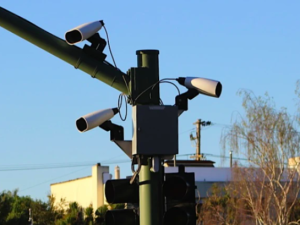
Government Technology Coverage of Cop Out Roundtable
April 2023: Government Technology published an article covering the Center's event, "Cop Out: Automation in the Criminal Legal System," covering the discussion around what’s at stake for communities subjected to these tools and whether new technology is simply exacerbating long-standing issues in the criminal justice system and reinforcing disparities.
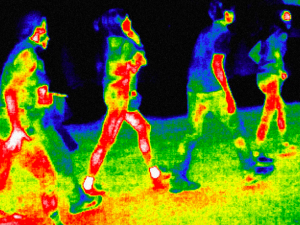
WIRED: ICE is Grabbing Data from Schools and Abortion Clinics
April 2023: Executive Director Emily Tucker was quoted in WIRED for an article about ICE surveillance. Tucker said, "I can’t help but feel that the federal government is using ICE as a data vacuum. They are looking for any way to access and integrate all kinds of data into massive databases."
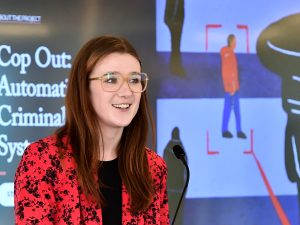
Roundtable Discussion of Cop Out: Automation in the Criminal Legal System
March 2023: The Center hosted a roundtable discussion during Georgetown's Tech Society Week previewing the Center's new interactive digital narrative Cop Out: Automation in the Criminal Legal System. The discussion featured Assia Boundaoui, journalist and filmmaker behind The Feeling of Being Watched and Inverse Surveillance Project; Nasser Eledroos, Managing Director of Northeastern Law’s Center on Law, Innovation, and Creativity; Meg Foster, Justice Fellow at the Center on Privacy & Technology; Puck Lo, Research Director at Community Justice Exchange; Freddy Martinez, Senior Researcher at Project on Government Oversight; and Paromita Shah, co-founder and Executive Director of Just Futures Law.
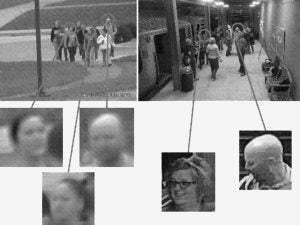
Gizmodo: The FBI Tested Facial Recognition Software on Americans
March 2023: Justice Fellow Meg Foster was quoted in a Gizmodo story by Mack DeGuerin about a government face recognition program recently exposed through documents obtained by the ACLU. “While Janus may have ended, these documents demonstrate that the prevailing approach to surveillance technology is to put the cart before the horse, and given the growing number of wrongful arrests stemming from face recognition, we know that the most vulnerable among us will experience the consequences first and hardest,” Foster said.

Testimony Before the NYC Council Committee on Consumer and Worker Protection
February 2023: Justice Fellow Meg Foster testified before the NYC Council Committee on Consumer and Worker Protection advocating for a complete ban on facial recognition technology.

Letter to the Consumer Financial Protection Bureau
February 2023: The Center signed on to a letter to the Consumer Financial Protection Bureau (CFPB) urging them to regulate the sale of "credit header" data, including names, addresses, and other sensitive personal information, which data brokers have purchased from sources like essential utility companies and sold to police and immigration enforcement. The letter's release was covered by WIRED.
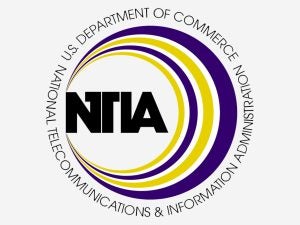
"Building on the Dream: Privacy, Equity, and Civil Rights" Event
January 2023: On January 18th, the Center on Privacy & Technology co-hosted "Building on the Dream: Privacy, Equity, and Civil Rights" with the Georgetown Law Tech Institute. The event featured US Assistant Secretary of Commerce Alan Davidson announcing a NTIA request for comments regarding how data practices affect civil rights and a panel of privacy and civil rights experts.

Newsletter on First Amendment Rights and Abortion
January 2023: Former associate Korica Simon published a piece in a newsletter for the Initiative for a Representative First Amendment (IfRFA) at the Berkman Klein Center at Harvard University in their capacity as a former IfRFA fellow. The piece talks about new laws states have passed around abortion, the intersection the first amendment rights and whether they are constitutional.

Gizmodo: Police Use of Facial Recognition Technology Risks Wrongful Arrests
January 2023: Clare Garvie, author of A Forensic Without the Science, was quoted in a Gizmodo article about facial recognition technology being misused as evidence and wrongfully arresting a Black man.

Article in the University of Richmond Public Interest Law Review
January 2023: Former Center on Privacy & Technology Associates Jameson Spivack and Korica Simon co-published an article in the University of Richmond Public Interest Law Review entitled "From Ban to Approval: What Virginia's Facial Recognition Technology Law Gets Wrong." The article uses Virginia’s recently passed legislation as a case study to show how legislation can fail to properly account for the harms of facial recognition technology in the law enforcement context.

Blog Post Named the Most-Read Tech Policy Press Contributor Post of 2022
December 2022: Executive Director Emily Tucker's blog post "Artifice and Intelligence" was named the most-read Tech Policy Press Contributor post of 2022. The post explained why the Privacy Center decided to stop using the terms “artificial intelligence,” “AI,” and “machine learning” in its work to expose and mitigate the harms of digital technologies in the lives of individuals and communities.

A Forensic Without the Science Featured in National Association of Attorneys General Panel
December 2022: Clare Garvie presented on an informational panel about face recognition alongside Patrick Grother and Gary Marchant for the 2022 National Association of Attorneys General Annual Meeting. The Center's newly released report A Forensic Without the Science: Face Recognition in the U.S. Criminal Investigations was circulated in advance as a CLE resource.

Further Comments of Support for the Stop Discrimination by Algorithms Act
November 2022: The Center submitted a letter to the Federal Trade Commission's Advanced Notice of Proposed Rulemaking on Commercial Surveillance and Data Security, a key proceeding with the potential to establish long-needed protections from abusive business practices enabled by the mass collection of personal data. The Center's comments urged the Commission to keep three specific contexts of surveillance-fuelled harm and injustice in mind in its rulemaking determinations, namely worker surveillance, immigrant surveillance, and systems of policing and punishment.

Op-Ed: The DC Council Must Pass the Stop Discrimination by Algorithms Act
October 2022: Senior Associate Cynthia Khoo co-authored an op-ed in the Washington Post with Daniel Jellins, staff lawyer and clinical teaching fellow at the Communications and Technology Law Clinic at Georgetown Law. The op-ed sets out the differences between algorithmic discrimination and "analog" discrimination; explains why algorithmic discrimination requires legal reform to address; and calls on DC Council to pass the Stop Discrimination by Algorithms Act.

Written Testimony Provided in Support of the Stop Discrimination by Algorithms Act
October 2022: The Center submitted written testimony in support of the Stop Discrimination by Algorithms Act to the Council of the District of Columbia, co-authored by Senior Associate Cynthia Khoo, Associate Korica Simon, and Executive Director Emily Tucker. Their comments expanded on Khoo's oral testimony at hearing, further elaborating on the nature of algorithmic discrimination; arguing that business costs should not be weighed in prohibiting illegal discrimination; correcting industry talking points regarding technical definitions and the state of the relevant legal, policy, and research field; and urging DC Council to act now to reduce harm, rather than wait to follow potential future federal initiatives.

Oral Testimony Provided in Support of the Stop Discrimination by Algorithms Act
September 2022: Senior Associate Cynthia Khoo submitted oral testimony in support of the Stop Discrimination by Algorithms Act (SDAA), at a hearing held by the Committee on Government Operations and Facilities at the Council of the District of Columbia. She emphasized that algorithmic discrimination is distinct from "analog" discrimination and pointed out that intent is not determinative in anti-discrimination law and is often missing from the kind of sociotechnical systems that give rise to algorithmic discrimination.
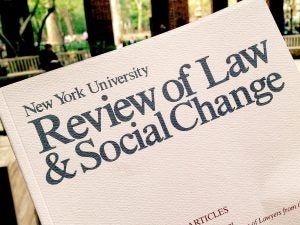
Article in the NYU Review of Law and Social Change
September 2022: Emily Tucker's article "Deliberate Disorder: How Policing Algorithms Make Thinking About Policing Harder" was published in the NYU Review of Law and Social Change Vol. 46. The article argues that algorithmic policing furthers brutality and interferes in critical deliberation of what policing is and what it should be.

American Dragnet Cited in Oversight Letter to ICE
September 2022: Senators Markey (D-MA) and Wyden (D-OR) sent an oversight letter to ICE Acting Director Johnson demanding answers about ICE's mass surveillance practices. The letter cited findings from the Center's report American Dragnet: Data-Driven Deportation in the 21st Century, as evidence of surveillance practices, use of face recognition technology, and contracts with private data brokers.

Washington Post: How Workers Can Protect Their Privacy
July 2022: Senior Associate Cynthia Khoo was quoted in a Washington Post article about workers' considerations when it comes to their private communications at work. She discussed various factors that workers should be aware of with respect to their digital security and communications privacy.
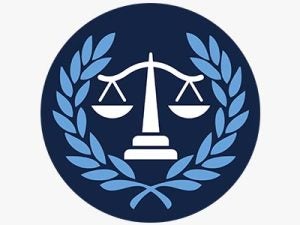
American Dragnet Entered Into House Judiciary Committee Record
July 2022: Representative Lofgren (D-CA 19) entered the Center's report, American Dragnet, into the record for the Digital Dragnets hearing in the House Judiciary Committee.

Op-Ed: Virginia's New Law Regulating Police Use of Face Recognition Technology Is Inadequate
June 2022: Associate Jameson Spivack published an op-ed in the Virginian-Pilot arguing that Virginia's new law regulating police face recognition technology does not adequately protect against the unique risks it poses.
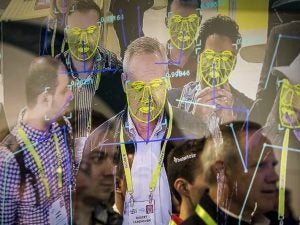
Op-Ed: Virginia's New Law Regulating Police Use of Face Recognition Technology Is Inadequate
June 2022: Associate Jameson Spivack published an op-ed in the Virginian-Pilot arguing that Virginia's new law regulating police face recognition technology does not adequately protect against the unique risks it poses.

Center's Founding Director Confirmed by the Senate to the FTC
May 2022: On Wednesday, May 11, the Center’s Founding Director, Alvaro Bedoya was confirmed by the Senate to the FTC.

Op-Ed: Selling Utility Data to ICE Restricts Access to Essential Utilities
May 2022: Associate Jameson Spivack was quoted in The Sunday Times about potential police use of face recognition technology in Ireland.

Op-Ed: Selling Utility Data to ICE Restricts Access to Essential Utilities
May 2022: Policy Associate Nina Wang published an op-ed in The Boston Globe urging lawmakers to take action and protect people living in the U.S. from ICE’s collection of utility data.

Comments on the Privacy Risks of Period-Tracking Apps
May 2022: Associate Korica Simon was quoted in USA Today speaking about period-tracking apps’ collection of user data and what privacy concerns such apps raise in the wake of the leaked Supreme Court draft opinion in Dobbs v. Jackson Women’s Health Organization.

Settlement Will Prevent Clearview AI from Selling Face Recognition Technology to Private Firms
May 2022: The ACLU of Illinois reached a settlement with Clearview AI on the matter of selling its faceprint databases. Last July, the Center, represented by Georgetown Law’s Civil Litigation Clinic, filed an amicus brief in the ACLU’s lawsuit, alleging violations of Illinois’ Biometric Information Privacy Act. While the lawsuit was specific to Illinois, the effects are far-reaching. It permanently bans Clearview from providing its massive faceprint database to private actors, nationwide, and bans them from providing it to law enforcement in Illinois for five years.

Executive Director Emily Tucker Named a 2021 Soros Justice Fellow
March 2022: Associate Jameson Spivack spoke about face recognition policy and privacy implications as part of the Tech Institute's "Tech Ideas Lunches" series open to Georgetown Law students, faculty, and staff.
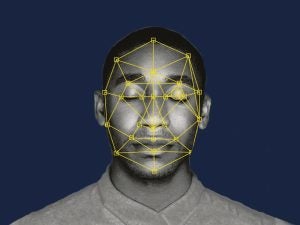
"Tech Ideas Lunches" Series
March 2022: Associate Jameson Spivack spoke about face recognition policy and privacy implications as part of the Tech Institute's "Tech Ideas Lunches" series open to Georgetown Law students, faculty, and staff.

Testimony to the House of Commons of Canada on Police Use of Facial Recognition Technology
March 2022: Associate Cynthia Khoo appeared before the Canadian House of Commons Standing Committee on Access to Information, Privacy and Ethics on March 21, 2022, testifying on police use of facial recognition technology based on her work as a Research Fellow at the Citizen Lab (University of Toronto). Khoo raised key concerns with facial recognition and algorithmic policing technologies, including systemic discrimination, constitutionality, transparency and accountability, and reliance of law enforcement on private sector commercial vendors.
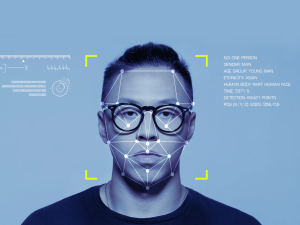
Op-Ed: New Jersey Should Restrict Law Enforcement's Use of Facial Recognition Technology
March 2022: The Center joined fifteen civil and digital rights groups in signing a letter and op-ed opposing law enforcement use of facial recognition technology in New Jersey. The letter highlights various harms that would result from law enforcement use of facial recognition technology, including an expansion to the over policing of Black and Brown communities.
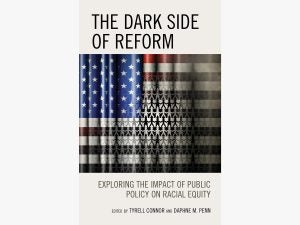
Chapter in The Dark Side of Reform
January 2022: Executive Director Emily Tucker's chapter, "Four Racial Justice Principles for Policy Response to Carceral Technology," was published in The Dark Side of Reform by Lexington Books. The book addresses the development of social policies with the potential to advance racial equity and the implications of such policy proposals.
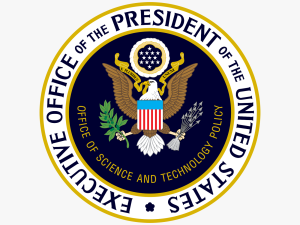
Advocacy for DC Community Control Over Police Surveillance Model Bill
January 2022: Associate Cynthia Khoo filed comments in response to the Office of Science and Technology Policy's Notice of Request for Information on Public and Private Sector Uses of Biometric Technologies. The Center's submission focused on biometric surveillance of low-wage workers, and highlighted the importance of situating biometric surveillance technologies in their full historical context through a racial justice and socioeconomic justice lens.
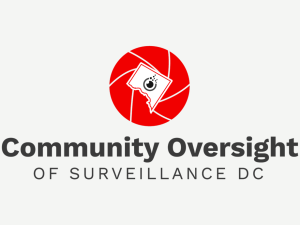
Advocacy for DC Community Control Over Police Surveillance Model Bill
January 2022: The Community Control Over Police Surveillance Model Bill (CCOPS) was a bill supported by the Community Oversight of Surveillance coalition that would require DC entities to obtain Council approval before acquiring new surveillance technology and entities would be required to report why they wanted to use the technology and the impact it would have on civil rights and liberties. The Center on Privacy and Technology was a client of the Communications and Technology Law Clinic and asked the clinic to advocate on our behalf at coalition meetings about CCOPS.

Joint Committee Hearing on Massachusetts Information Privacy Act
October 2021: Associate Cynthia Khoo submitted oral and written testimony on the Massachusetts Information Privacy Act, to the MA Joint Committee on Advanced Information Technology, the Internet and Cybersecurity. MIPA would restrict biometric and worker surveillance and algorithmic discrimination.

News Beat Podcast: Facial Recognition & Wrongful Arrests
October 2021: News Beat highlighted the wrongful arrests of Michigan residents Michael Oliver and Robert Williams. Center Senior Associate Clare Garvie spoke with hosts about the risks to free speech and privacy posed by the widespread adoption of the technology, misuse, and its racial impacts.

Comments to NIST on “Managing Bias” in Artificial Intelligence
September 2021: Associate Cynthia Khoo filed comments regarding “A Proposal for Identifying and Managing Bias in Artificial Intelligence” by the National Institute of Science and Technology. The submission focuses on civil rights impacts and the limits of a technical approach to algorithmic bias.

Amicus Curiae Brief in Illinois Face Recognition Case
June 2021: Associate Jameson Spivack wrote an op-ed in The Washington Post arguing that Maryland's criminal justice reform legislation should include restrictions on predictive police technologies.

Op-Ed: Maryland Should Restrict Predictive Police Technologies
June 2021: Associate Jameson Spivack wrote an op-ed in The Washington Post arguing that Maryland's criminal justice reform legislation should include restrictions on predictive police technologies.

60 Minutes Highlights Police Face Recognition Technology
May 2021: CBS 60 Minutes profiled the use of face recognition by police in the wake of three publicized misidentifications resulting from the technology. Senior Associate Clare Garvie was interviewed.

PBS: How Racial Biases can Corrupt Facial Recognition Technology
May 2021: PBS NOVA produced a segment on police face recognition risks, highlighting the misidentification of Detroit resident Michael Oliver. Senior Associate Clare Garvie was interviewed.

"Coded Bias" Documentary Screening
April 2021: The Center hosted a virtual screening of the documentary Coded Bias. Center Senior Associate Clare Garvie provided a video introduction to the screening, connecting the themes in the film to the Center’s research and advocacy.
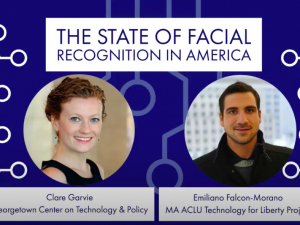
The State of Face Recognition in America Webinar
March 2021: A student chapter of AI4ALL, a US-based nonprofit dedicated to increasing diversity and inclusion in AI research and policy, invited Senior Associate Clare Garvie to give a webinar with Emiliano Falcon-Morano of ACLU-MA on face recognition use by police.

Unfamiliar Face Identification Group Keynote
February 2021: Senior Associate Clare Garvie gave a keynote presentation about face recognition in U.S. policing for the UFIG annual meeting, an initiative at the University of New South Wales aimed at informing the debate around face recognition development and deployment.

City Surveillance Watch Podcast
January 2021: Center Associate Jameson Spivack was featured in a three-part podcast series, City Surveillance Watch, exploring how cities are using surveillance technologies, and the implications of these invasive tools.

City Surveillance Watch Podcast
January 2021: Center Associate Jameson Spivack was featured in a three-part podcast series, City Surveillance Watch, exploring how cities are using surveillance technologies, and the implications of these invasive tools.
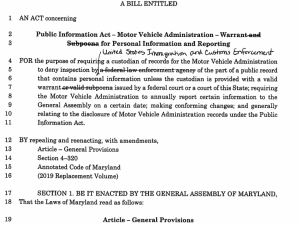
GU Law Facial Recognition Experts Launch “Week One” Simulation
January 2021: Director of Research and Advocacy Emily Tucker and Senior Associate Clare Garvie co-taught a Week One course for 1Ls on big data, face recognition, and legislative lawyering, culminating in a mock hearing where students argued the merits of a bill limiting federal access to Maryland driver data.

Coalition Letter Spurs FTC Investigation of Data Bias
December 2020: Associate Director Laura Moy and former Associate Gabrielle Rejouis released a report through the Day One Project, “Addressing Challenges at the Intersection of Civil Rights and Technology,” outlining critical inefficiencies when it comes to federal agencies actively combating such issues.

Policy Proposal on Civil Rights and Technology Published by Day One Project
December 2020: Associate Director Laura Moy and former Associate Gabrielle Rejouis released a report through the Day One Project, “Addressing Challenges at the Intersection of Civil Rights and Technology,” outlining critical inefficiencies when it comes to federal agencies actively combating such issues.
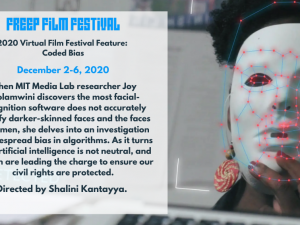
Detroit Free Press Film Festival Hosts Panel on Face Recognition
December 2020: Following a screening of Coded Bias, Senior Associate Clare Garvie joined a discussion with Data for Black Lives National Organizing Director Tawana Petty about surveillance in Detroit hosted by Detroit Free Press.
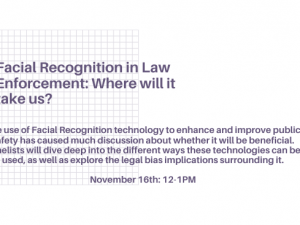
Panel: AI and Bias
November 2020: The Center files an amicus brief arguing that Baltimore Police Department’s warrantless aerial surveillance program is unconstitutional.

Coded Bias: A Look at Artificial Intelligence & Law Enforcement
November 2020: Senior Associate Clare Garvie joined an expert panel discussing Coded Bias, a documentary about face recognition bias. Other panelists included director and producer Shalini Kantayya, MIT researcher Joy Buolamwini and ACLU's Kade Crawford; moderated by CNN's Van Jones.

Coded Bias: A Look at Artificial Intelligence & Law Enforcement
November 2020: Senior Associate Clare Garvie joined an expert panel discussing Coded Bias, a documentary about face recognition bias. Other panelists included director and producer Shalini Kantayya, MIT researcher Joy Buolamwini and ACLU's Kade Crawford; moderated by CNN's Van Jones.

Panel: Racial Bias in AI
October 2020: Center Policy Associate Jameson Spivack spoke as part of an expert panel "Racial Biases in Artificial Intelligence" for a webinar hosted by University of Maryland business school.

The Perpetual Line-Up Recognized
October 2020: The Perpetual Line-Up, the Center's foundational face recognition report, was recognized by the inaugural Tech Spotlight at the Harvard Kennedy School's Belfer Center, highlighting initiatives that orient technology to a public purpose and ensure its safety, fairness, and inclusivity.

Document Journal: Your Face is Already in a Criminal Lineup
October 2020: Senior Associate discussed the risks of police face recognition use in a long-form Q&A with Document Journal.

GAO: CBP Should Address Privacy and System Performance Issues
September 2020: The Government Accountability Office issued a report finding that airport face scans did not improve airport agents' day-to-day capabilities. The Center's December 2017 report, Not Ready for Takeoff, found that airport face scans were unjustified.

Op-Ed: The Cruel New Era of Data-Driven Deportation
September 2020: Founding Director Alvaro Bedoya wrote a piece in Slate on why people should care about Palantir's direct listing and what it means for immigrants and the native-born alike.
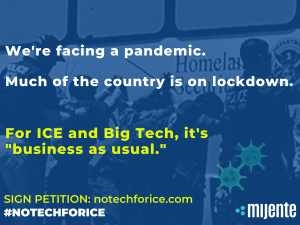
Digital Day of Action #NoTechForICE
September 2020: The Center participated in the Digital Day of Action #NoTechForICE campaign around Palantir's direct listing. The campaign raised awareness that Palantir is a company that profits off the surveillance and exploitation of communities targeted by ICE and the Department of Defense.

Coalition Letter Urging FTC to Study Data, Bias, and Disparate Impact
September 2020: Associate Director Laura Moy organized a coalition letter urging the FTC to include questions on data, bias, and disparate impact in any new studies the agency undertakes. The letter was signed by 27 civil rights, digital rights, racial justice organizations, and consumer groups.
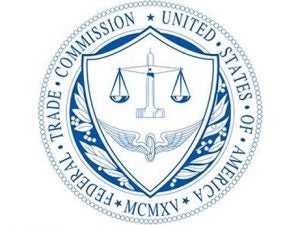
Coalition Letter Urging FTC to Study Data, Bias, and Disparate Impact
September 2020: Associate Director Laura Moy organized a coalition letter urging the FTC to include questions on data, bias, and disparate impact in any new studies the agency undertakes. The letter was signed by 27 civil rights, digital rights, racial justice organizations, and consumer groups.
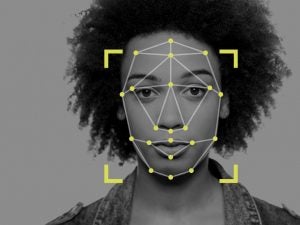
Report: Legislative Approaches to Face Recognition Around the Country
September 2020: Policy Associate Jameson Spivack and Senior Associate Clare Garvie’s paper analyzing how lawmakers around the US are trying to regulate face recognition was published in the AI Now Institute’s biometric technologies report.
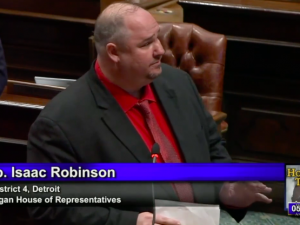
The Wright Museum Presents: Technologies of Oppression
September 2020: Senior Associate Clare Garvie spoke on a panel paying tribute to the late MI State Rep. Isaac Robinson about the fight for racial justice in Detroit, hosted by the Wright Museum and Detroit Public Television, and moderated by Tawana Petty of the Detroit Community Technology Project.
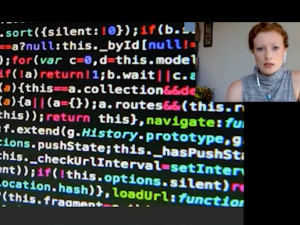
70 Million Podcast: Face Recognition and Detroit
September 2020: Senior Associate Clare Garvie participated in an NACDL training webinar on face recognition in criminal trials, alongside computer scientist Dr. Arun Ross and ACLU Michigan senior staff attorney Phil Mayor.

70 Million Podcast: Face Recognition and Detroit
September 2020: Senior Associate Clare Garvie was interviewed for the 70 Million podcast about police use of face recognition in Detroit and ongoing efforts of community members to put a stop to it.

Podcast: Banned In PDX, Tracking Portland's Face Recognition Ban
August 2020: In an episode of the podcast series Banned in PDX, Policy Associate Jameson Spivack discusses police use of face recognition on protesters, with a focus on Portland, OR.
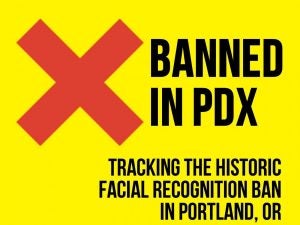
Podcast: Banned In PDX, Tracking Portland's Face Recognition Ban
August 2020: In an episode of the podcast series Banned in PDX, Policy Associate Jameson Spivack discusses police use of face recognition on protesters, with a focus on Portland, OR.

Face Technology Could Stymie First Amendment-Protected Activities
August 2020: Senior Associate Clare Garvie spoke to Digital Privacy News about developments in the ongoing effort to bring police face recognition under control since the Center released The Perpetual Line-Up in 2016.

Town Hall: The Dangers of Face Recognition and How to Respond
August 2020: Senior Associate Clare Garvie participated in a town hall on face recognition hosted by the Project on Government Oversight with Malkia Cyril of the Center for Media Justice, Matt Cagle of ACLU NorCal, POGO's Jake Laperruque, Rep. Jimmy Gomez, and Sen. Jeff Merkley.

Op-Ed: Law Enforcement Could Leverage Facial Recognition During Protests
July 2020: Policy Associate Jameson Spivack wrote an op-ed for Route Fifty about the lack of police face recognition regulation, how this allows police to surveil protesters, and the potential consequences for civil rights and liberties.

Op-Ed: Law Enforcement Could Leverage Facial Recognition During Protests
July 2020: Senior Associate Clare Garvie was interviewed on CounterSpin about police face recognition misuse, misidentifications, and the risks to free speech and association in light of nationwide protests.

CounterSpin Interview: Face Recognition and Free Speech
July 2020: Senior Associate Clare Garvie was interviewed on CounterSpin about police face recognition misuse, misidentifications, and the risks to free speech and association in light of nationwide protests.
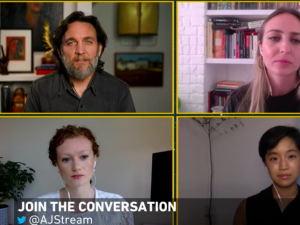
AJ Stream: Will Spy Tech Put an End to Protesting Forever?
July 2020: Senior Associate Clare Garvie joined a panel on face recognition and public protest hosted by Al Jazeera's The Stream, along with Silkie Carlo of Big Brother Watch and reporter Mary Hui.

Is your face your own? AI, Facial Recognition, and the Arts
July 2020: Following a presentation by artist Adam Chin on his latest exhibition Front and Profile, Senior Associate Clare Garvie joined a conversation hosted by SF Camerawork about AI, criminal justice, and the role of art in exposing and examining these issues.
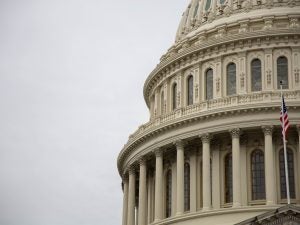
Coalition Letter to Congress on Police Face Recognition
July 2020: The Center was one of 40 organizations that wrote a letter urging Congress to pass strong police face recognition legislation, stop continued federal funding for the technology, and ensure policing reforms include face recognition prohibitions. Photo by Joshua Sukoff on Unsplash
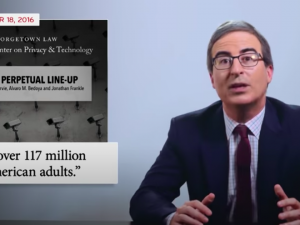
Coalition Letter to Congress on Police Face Recognition
June 2020: The Perpetual Line-Up, the Center's foundational face recognition report, was cited in the "Last Week Tonight" segment on face recognition technology. Senior Associate Clare Garvie also contributed to the reporting on background.

Center research profiled on Last Week Tonight with John Oliver
June 2020: The Perpetual Line-Up, the Center's foundational face recognition report, was cited in the "Last Week Tonight" segment on face recognition technology. Senior Associate Clare Garvie also contributed to the reporting on background.
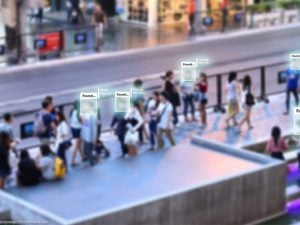
The Untold Number of People Implicated Because of Face Recognition
June 2020: Responding to news of an arrest made on the basis of a face recognition misidentification, Senior Associate Clare Garvie wrote an article for ACLU's website about the likelihood that this has happened before—and will continue to happen.
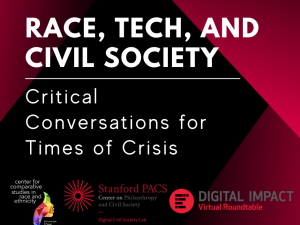
Legitimizing True Safety
June 2020: Senior Associate Clare Garvie participated on a panel about police surveillance in Detroit organized by Stanford's Digital Civil Society Lab. Other speakers included Tawana Petty, Eric Williams, and Cierra Robson.

Coalition Letter to Congress on Protests and Police Reform
June 2020: The Center joined over 100 organizations calling on Congress to cease federal funding for police surveillance technology used to criminalize dissent. Photo by Liam Edwards on Unsplash.

Principles to Guide COVID Response Tech
June 2020: The Center joined over 80 other organizations in calling for information technologies deployed to combat the spread of COVID-19 to preserve civil rights and privacy. Photo by Oleg Magni on Unsplash.

Guide on Inclusive Tech Policy Organizations
June 2020: The Center launched the "A Seat at the Table: Creating Inclusive Tech Policy Organizations" co-authored by Center Associate Gabrielle Rejouis. The guide provides tips on advertising practices, creating opportunities, and retaining diverse employees. Image Credit: CreateHER Stock.

Coalition Letter for State Worker Protections
May 2020: The Center coordinated a letter with 9 other organizations urging state governors to issue policies protecting essential workers during the pandemic and to petition OSHA to issue an emergency temporary standard to that end. Photo by Clark Van Der Beken on Unsplash.
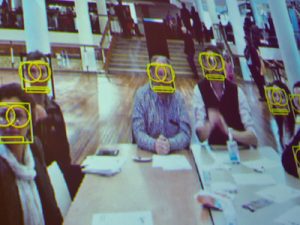
Interview: Carnegie Council for Ethics in International Affairs Podcast
April 2020: Policy Associate Jameson Spivack joined the Carnegie Council podcast for a discussion on the risks of police face recognition, proposed legislation to regulate it, and privacy in a time of increased health surveillance.
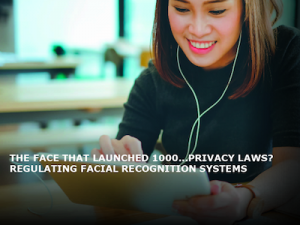
IAPP Webinar: The Face that Launched 1000... Privacy Laws?
April 2020: Senior Associate Clare Garvie participated in an online panel organized by IAPP and FPF on the current state of face recognition legislation in the U.S. Clare spoke alongside Brenda Leong of FPF, James Loudermilk of IDEMIA, and Hector Dominguez Aguirre with the City of Portland.

Letter to the Union Federation of Teachers on Face Recognition Use
March 2020: The Center joined 29 other organizations in signing a letter to the United Federation of Teachers (UFT) urging it to cancel any existing contracts for face surveillance. In response to the letter, UFT committed to opposing face recognition use in NYC schools.

Op-Ed: OK Google, Black History Month Is Over. What Now?
March 2020: Policy Associate Jameson Spivack testified before the Maryland House of Delegates in supporting of legislation that would place a moratorium on law enforcement use of face recognition technology. He testified alongside advocate Amara Majeed, among others.

Op-Ed: OK Google, Black History Month Is Over. What Now?
March 2020: Associate Gabrielle Rejouis argued algorithmic accountability must incorporate civil rights principles by examining Google algorithms that discriminated against Black people in an op-ed for Medium's OneZero publication. Photo by Mitchell Luo on Unsplash.

Op-Ed: Maryland’s invasive face recognition system
March 2020: Founding Director Alvaro Bedoya was named to The Washington Post's Technology 202 Network panel of technology experts.

Op-Ed: Maryland’s invasive face recognition system
March 2020: Policy Associate Jameson Spivack argued in The Baltimore Sun that Maryland has one of the most invasive face recognition systems in the nation, and that it was time for the legislature to put a moratorium on police face recognition use.

Who Has Your Face?
March 2020: EFF has created a website to help the public learn how their face scans are used. The website draws on information uncovered by the Center in previously unpublished FOIA response documents.
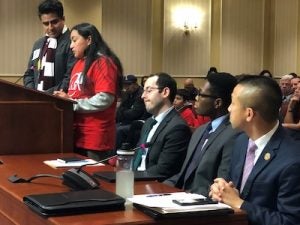
Senior Associate Testifies in Maryland
February 2020: Senior Associate Harrison Rudolph testified before the Maryland House of Delegates and Maryland Senate in support of legislation that would require ICE to obtain a warrant before accessing driver data.

Location Privacy Complaint Leads to FCC Action
February 2020: Citing the Center's research and privacy, accuracy, and bias concerns, the Globe's Editorial Board recommends that the Massachusetts legislature and lawmakers across the country hit the pause button on police face recognition use.

Boston Globe Calls for Face Recognition Moratorium, Controls
February 2020: Citing the Center's research and privacy, accuracy, and bias concerns, the Globe's Editorial Board recommends that the Massachusetts legislature and lawmakers across the country hit the pause button on police face recognition use.

NIST publishes Face Recognition Vendor Test on demographic effects
December 2019: Citing the Center's 2016 report, The Perpetual Line-Up, as motivation, NIST released a report on differential error rates by race, sex, and age in face recognition algorithms. This fulfills one of our 2016 recommendations that NIST test for racial bias in the technology.

Center releases Worker Privacy discussion draft bill
November 2019: The Center released the "Worker Privacy Act," a discussion draft bill on worker privacy protections which increases employee input, prohibits certain uses of data, expands who is considered an employer, and designates a federal office to address worker privacy concerns.

Center releases Worker Privacy discussion draft bill
November 2019: The Center released the "Worker Privacy Act," a discussion draft bill on worker privacy protections which increases employee input, prohibits certain uses of data, expands who is considered an employer, and designates a federal office to address worker privacy concerns.
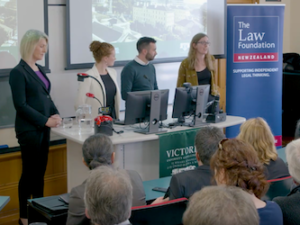
Policy Associate Testifies to MA Legislature on Police Face Recognition
October 2019: Senior Associate Clare Garvie participated in a public panel and government workshop on the legal and ethical issues surrouring face recognition technology in Wellington, New Zealand. The events were hosted by Victoria University Wellington.

Center Research Supports NYTimes Exposé on Immigrant Surveillance
October 2019: Investigative reporter McKenzie Funk published an exposé in The New York Times, "How ICE Picks Its Targets in the Surveillance Age." Funk's article cited the Center's research on ICE requests for face recognition searches of state DMV databases.

Center Research Supports NYTimes Exposé on Immigrant Surveillance
October 2019: Investigative reporter McKenzie Funk published an exposé in The New York Times, "How ICE Picks Its Targets in the Surveillance Age." Funk's article cited the Center's research on ICE requests for face recognition searches of state DMV databases.
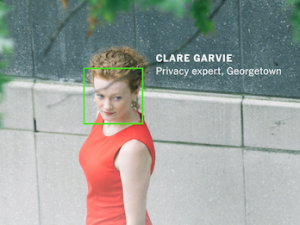
Senior Associate Presents to Portland City Council Working Group
October 2019: “We’re all getting comfortable with face recognition,” Senior Associate Clare Garvie warns in a New York Times video op-ed. “But the convenience is blinding us to how risky this technology actually is, and how it is being used without us realizing.”

Senior Associate Presents to Portland City Council Working Group
September 2019: Associate Harrison Rudolph testified before the Utah Legislature's Government Operations Interim Committee about face recognition technology. The meeting followed reports about the Center's research showing Utah's ID photos had been routinely scanned by law enforcement.
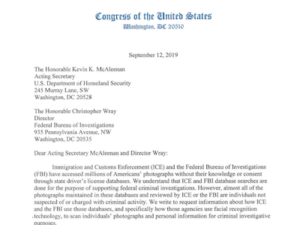
Associate Testifies Before Utah Legislature on Police Face Recognition
September 2019: A bipartisan, bicameral group of legislators sent an oversight letter to the DHS and FBI concerning government use of face recognition technology. The letter followed reports about Center research showing how federal agencies requested face recognition searches of state databases.

Bipartisan, Bicameral Congressional Oversight Letter to FBI, DHS
September 2019: A bipartisan, bicameral group of legislators sent an oversight letter to the DHS and FBI concerning government use of face recognition technology. The letter followed reports about Center research showing how federal agencies requested face recognition searches of state databases.

New Paper on "Moving the Encryption Policy Conversation Forward"
September 2019: Executive Director Laura Moy joined other experts on a new working group paper on moving the encryption policy conversation forward. The paper offers suggestions for this issue along with principles and use cases to be used to evaluate emerging policy proposals related to encryption.

Op-Ed: Why Is It OK for Employers to Constantly Surveil Workers?
September 2019: Law Fellow Gabrielle Rejouis published an op-ed in Slate's Future Tense on the dangers of workplace surveillance and the need for privacy protections.

Executive Director Speaks to Marketplace Podcast
August 2019: Executive Director Laura Moy spoke on the Marketplace "Make Me Smart" podcast about what privacy means in the era of big tech.

Executive Director Speaks to Marketplace Podcast
August 2019: Executive Director Laura Moy spoke on the Marketplace "Make Me Smart" podcast about what privacy means in the era of big tech.

DMV Searches by ICE Earn Criticism and Calls for Investigation in Utah
July 2019: After The Washington Post reported the Center's research on ICE's FR searches on DMV databases in Utah and Washington, Utah Lt. Gov. Cox expressed concern and said the they would be investigating ICE's access. The Center's findings left lawmakers and civil society groups in Utah outraged.

Center Report Spurs Debate, Legislation in Detroit
July 2019: Law Fellow Gabrielle Rejouis spoke on the IGF-USA "Which National Privacy Strategy Should the US adopt?" panel. The panel examined different privacy frameworks and the benefits of each approach.

Law Fellow Speaks on IGF-USA Panel
July 2019: Law Fellow Gabrielle Rejouis spoke on the IGF-USA "Which National Privacy Strategy Should the US adopt?" panel. The panel examined different privacy frameworks and the benefits of each approach.

Law Fellow Speaks on Paying for Our Privacy Panel
July 2019: Law Fellow Gabrielle Rejouis spoke on the OTI "Paying for Privacy" panel discussing how federal privacy legislation may impact current online business models.

Center Files Location Privacy Complaint with FCC
July 2019: Center Freedom of Information Act requests showed that ICE had asked at least three states that offer undocumented people driver’s licenses to run face recognition searches of their DMV photos. The documents were released via an exclusive with The Washington Post.

Op-Ed: How Data Practices Hinder the Spread of Information
June 2019: The Center, with New America's Open Technology Institute and Free Press, filed a complaint with the FCC against wireless carriers for sharing customers' location information without consent. The Center was represented by the Samuelson-Glushko Technology Law & Policy Clinic at Colorado Law.

Op-Ed: How Data Practices Hinder the Spread of Information
June 2019: Law Fellow Gabrielle Rejouis wrote an op-ed connecting the history of Juneteenth, when news of emancipation reached Texas slaves, to current digital disruptions of communication, including optimization algorithms and disinformation.

New York Times Calls for Regulation of Facial Recognition
May 2019: Citing the Center's reports, The New York Times' editorial board called for regulation of NYPD's use of face recognition, warning that "dragnets become tools aimed at minority populations." Earlier, columnist Farhad Manjoo called for a moratorium on the technology based on Center reports.

House Oversight Committee Hearing on Face Recognition
May 2019: Senior Associate Clare Garvie testified before the House Committee on Oversight and Reform. She argued that in the absence of regulation police use of face recognition poses risks to our First, Fourth, and Fourteenth Amendment rights. Because of those risks, a moratorium is appropriate.

NPR: San Francisco Bans Facial Recognition Tech
May 2019: Senior Associate Clare Garvie spoke with NPR's On Point about the recent San Francisco face recognition ban and the privacy and civil liberties concerns surrounding police use of the technology.

Report: America Under Watch: Face Surveillance in the United States
May 2019: Senior Associate Clare Garvie and Executive Director Laura Moy explained how police agencies in Chicago and Detroit have purchased citywide face surveillance networks that are capable of scanning the faces of city residents in real time as they walk down the street.

Executive Director Delivers Presentation Before Washington State Supreme Court
May 2019: Senior Associate Clare Garvie explained how police agencies across the country misuse face recognition technology, referencing actual use cases from the NYPD. Analysts using these systems sometimes submit forensic sketches and routinely doctor low-quality photos to make them clearer.

Executive Director Delivers Presentation Before Washington State Supreme Court
April 2019: Executive Director Laura Moy has been part of a working group on encryption policy since 2018. The working group released two papers: one on "Likely Future Adoption of User-Controlled Encryption," and one on "Implications of Quantum Computing for Encryption Policy."

Encryption Working Group Releases Two Papers
April 2019: Executive Director Laura Moy has been part of a working group on encryption policy since 2018. The working group released two papers: one on "Likely Future Adoption of User-Controlled Encryption," and one on "Implications of Quantum Computing for Encryption Policy."

Coalition Letter Sent to Commerce Committees on Disproportionate Data Harms
April 2019: The Center joined 25 other digital rights and civil rights organizations elevating particular harms experienced by vulnerable communities. Addressed to the House and Senate Commerce committees, the letter raised key provisions data practices legislation should include.

Center Endorses Algorithmic Accountability Bill
April 2019: The Center endorsed the Algorithmic Accountability Act of 2019, introduced by Sen. Ron Wyden (D-OR), Sen. Cory Booker (D-NJ), and Rep. Yvette Clarke (D-NY). The bill requires companies to evaluate the algorithms they use for bias.

Center Associate Endorses Wasserman Bill
April 2019: Associate Harrison Rudolph endorsed Rep. Debbie Wasserman Schultz's (D-FL) bill, the Families, Not Facilities Act. The bill would prohibit the use of children's information to find and deport their loved ones.

Founding Director Delivers Chavez Lecture on Privacy and Civil Rights
April 2019: Founding Director Alvaro Bedoya delivered the U.S. Senator Dennis Chavez Endowed Lecture on Law & Civil Rights at the University of New Mexico School of Law. In his lecture, he drew upon the research underlying several Color of Surveillance conferences to argue that privacy should be considered a civil right, not just a civil liberty.

EFF Highlights Chavez Lecture
April 2019: In an blog post sent to close to half a million Twitter followers, Shahid Buttar of the Electronic Frontier Foundation promoted our founding director's Chavez lecture on the connection between privacy and civil rights. Buttar argued that the lecture, along with the Center's Color of Surveillance conference series, are "key pieces of a growing effort to ensure that privacy and protection from surveillance are seen as part of defending civil rights."

Amici Curiae Brief in support of Petitioner
April 2019: The Center's Policy Associate Jameson Spivack was interviewed and quoted in The Hill about recent legislative efforts to combat the potential discriminatory effects of AI. "I think that any legislation needs to recognize that while these technologies affect everyone, they disproportionately affect vulnerable people."

Amici Curiae Brief in support of Petitioner
March 2019: The Center joined ACLU, EFF, and Innocence Project in filing an amicus brief in support of Willie Allen Lynch, petitioner to the Florida Supreme Court. The brief argues that the state failed in its obligation to disclose information about its use of face recognition technology to the petitioner.

Local Government, Facial Recognition, and Privacy
March 2019: Senior Associate Clare Garvie participated in a workshop at the Cleveland-Marshall College of Law on regulating the use of face recognition by law enforcement and commercial entities.

Talk on Location Privacy at SXSW Festival
March 2019: The Center's Executive Director, Laura Moy, delivered a talk at SXSW on location privacy. She explained the growing scale and sophistication of numerous location tracking technologies, and made the case for policies to salvage our disappearing location privacy.

Coalition Letter on Federal Privacy Conversations Calls for Centrality of Civil Rights
February 2019: The Center joined 42 other digital rights and civil rights organizations calling for Congress to prioritize civil rights debates, hearings, and legislation.

Federal Law Pauses Parent Trap
February 2019: A federal law was signed prohibiting the use of children's information for deportation purposes until September 30, as part of the 2019 Homeland Security Appropriations Bill. The law followed a November 2018 letter, coordinated by the Center and co-signed by 111 other NGOs, calling for the termination of an interagency agreement that used children's information to find and deport their relatives.

Federal Law Pauses Parent Trap
February 2019: The Center signed on to a letter from 47 organizations calling on legislators to protect civil rights, equity, and equal opportunity in the digital ecosystem. The letter draws directly from the Civil Rights Principles for the Era of Big Data released in 2014 and includes a call for for fairness in automated decisions and an end to high-tech profiling.

Opportunities for Bipartisan Tech Policy
January 2019: Executive Director Laura Moy spoke at an event co-hosted by Next Century Cities, the American Action Forum, and Public Knowledge exploring opportunities for bipartisan action on technology policy issues in the new Congress.

Opportunities for Bipartisan Tech Policy
January 2019: Executive Director Laura Moy spoke at an event co-hosted by Next Century Cities, the American Action Forum, and Public Knowledge exploring opportunities for bipartisan action on technology policy issues in the new Congress.

Data for Black Lives: Abolition in the Age of Big Data
January 2019: Executive Director Laura Moy spoke at the second annual Data for Black Lives conference on a panel discussing "Abolition in the Age of Big Data."

Safe Face Pledge
December 2018: The Center worked with computer scientist Joy Buolamwini to create a pledge for vendors of automated facial analysis technologies to sign signalling their commitment to responsibility and accountability.

Washington Post: Facial Recognition Could Make Us Safer—and Less Free
December 2018: The Washington Post's Editorial Board reiterated its call for Congress to step in and decide the line between acceptable and unacceptable uses of face recognition technology, after the Department of Homeland Security announced a real-time face surveillance pilot at the White House.

Congressional Letter re: DHS' Parent Trap
December 2018: The New Yorker talked to Senior Associate Clare Garvie for an in-depth examination into how face recognition is revolutionizing everything from farming in Ireland to policing in the United States.

New Yorker: Should We Be Worried About Computerized Facial Recognition?
December 2018: The New Yorker talked to Senior Associate Clare Garvie for an in-depth examination into how face recognition is revolutionizing everything from farming in Ireland to policing in the United States.

Comments to FTC on "Competition and Consumer Protection in the 21st Century"
December 2018: Executive Director Laura Moy filed comments relevant to a planned Federal Trade Commission hearing on competition and consumer protection in the 21st Century. She argued that discriminatory data practices should not be allowed and that when consumers cannot avoid sharing their information, heightened privacy protections should apply.

Coalition Comments to DHS & HHS on Unaccompanied Immigrant Children
November 2018: The Center drafted, organized, and filed comments, signed by thirteen other organizations, regarding the administration's use of children's information to deport their relatives. The comments explain that deporting families using information collected to place unaccompanied children is not only inhumane, but also unlawful and poor policy.

Coalition Letter to DHS and HHS About Both Agencies' Parent Trap
November 2018: The Center coordinated a letter to the Departments of Health and Human Services and Homeland Security calling for the recission of an interagency agreement that uses children's information to deport their relatives. 111 other civil rights and civil liberties organizations signed on to the letter, which received coverage in the Associated Press.

Comments to NTIA on "Developing the Administration’s Approach to Consumer Privacy"
November 2018: The Center submitted comments to the National Telecommunications and Information Administration urging the agency to move further in the direction of strong consumer protection as it defines the privacy outcomes and high-level goals that this administration will prioritize.

Public Interest Privacy Legislation Principles Signed by 34 Organizations
November 2018: The Center co-drafted principles outlining essential components to be included in comprehensive privacy legislation. The principles were backed by 34 organizations.

NIST International Face Performance Conference
November 2018: Senior Associate Clare Garvie spoke at the National Institute of Standards and Technology's first conference, on a panel about technical factors affecting the deployment and use of face recognition technology. Clare's remarks focused on the real-world consequences of differential error rates, including in the law enforcement context.

Wall Street Journal: Facial Recognition Tech Aims to Identify Good and Evil
November 2018: The Wall Street Journal featured Senior Associate Clare Garvie in an episode of its “Moving Upstream” video series. In the interview, Clare discusses the use of face recognition technology by schools, police departments, border security organizations, and others.

Senate Testimony on Consumer Privacy
October 2018: Executive Director Laura Moy testified about consumer privacy before the Senate Commerce Committee. She called for increased attention to commercial data practices that can lead to societal harms, such as discrimination, erosion of trust online, amplification of hate speech, and dissemination of propaganda, misinformation, and disinformation.

Senate Testimony on Consumer Privacy
October 2018: Executive Director Laura Moy testified about consumer privacy before the Senate Commerce Committee. She called for increased attention to commercial data practices that can lead to societal harms, such as discrimination, erosion of trust online, amplification of hate speech, and dissemination of propaganda, misinformation, and disinformation.

The FAA Reauthorization Act of 2018
October 2018: On October 5, 2018, a federal law was signed requiring privacy and racial bias assessments of the federal government's use of biometric technologies at airports—the first ever federal law requiring artificial intelligence bias testing. The law was enacted following the Center's December 2017 report, Not Ready For Takeoff, which found privacy and bias problems in these deployments.

DHS OIG Audit of Biometric Exit
September 2018: The Office of the Inspector General for the Department of Homeland Security conducted an audit of the agency's use of face scans at airport departure gates that closely tracked and validated many of the concerns raised in the Center's Not Ready for Takeoff report. OIG reported, among other things, that the program exhibits age bias, causes traveler delays, and may end up being far more costly than initial estimates.

Turning the Tide on Police Surveillance
September 2018: Executive Director Laura Moy spoke on a panel hosted by New America on police surveillance and the adoption—by a growing number of cities—of ordinances that help create opportunities for communities to exercise control over the surveillance technologies their police agencies have and use.

Face Off: Recognizing and Challenging the Use of Facial Recognition Technology
September 2018: Senior Associate Clare Garvie participated in a training webinar for public defenders on police use of face recognition technology convened by the National Association of Criminal Defense Lawyers.

Defender Summer School's Facial Recognition Software and Eyewitness Identification Series
August 2018: The Center drafted, coordinated, and filed comments signed by 16 organizations in response to the Federal Trade Commission's inquiry on 21st Century competition and consumer protection. The comments highlight the harms faced by marginalized communities on online platforms.

Defender Summer School's Facial Recognition Software and Eyewitness Identification Series
August 2018: Senior Associate Clare Garvie conducted a training on police use of face recognition technology to the Ninth Judicial Circuit 2018 Defender Summer School at Barry University in Orlando, FL.

House of Representatives Testimony on Consumer Privacy
July 2018: Executive Director Laura Moy testified about consumer privacy before the House Energy & Commerce Committee Subcommittee on Communications and Technology. In her testimony, Laura called for privacy legislation that establishes rulemaking authority and strong enforcement, and does not eliminate existing protections for consumers' data

Location Privacy After Carpenter v. United States, Part I
July 2018: The Center hosted a half-day event discussing the implications of the Supreme Court's decision in Carpenter v. United States, a landmark case about the privacy of cell phone location information.

The Color of Surveillance: Government Monitoring of American Religious Minorities
July 2018: The third annual Color of Surveillance conference delved into the surveillance of religious minorities in the United States. In addition to discussions about this issue's contemporary impact, the conference featured a historian who spoke about surveillance of the Pilgrims in England.

The Color of Surveillance: Government Monitoring of American Religious Minorities
July 2018: The third annual Color of Surveillance conference delved into the surveillance of religious minorities in the United States. In addition to discussions about this issue's contemporary impact, the conference featured a historian who spoke about surveillance of the Pilgrims in England.

Op-Ed: Facial Recognition Threatens Our Fundamental Rights
July 2018: Senior Associate Clare Garvie wrote an op-ed for The Washington Post about how face surveillance technology risks changing our expectations of privacy, our right not to be investigated unless suspected of wrongdoing, and our freedom from deeply flawed policing practices.

Op-Ed: A License to Discriminate
June 2018: Executive Director Alvaro Bedoya argued in an op-ed for The New York Times that "the impact of consumer tracking varies greatly by race, class, and power."

Op-Ed: A License to Discriminate
June 2018: Executive Director Alvaro Bedoya argued in an op-ed for The New York Times that "the impact of consumer tracking varies greatly by race, class, and power."

Oppression of the Future in “Safe Surrender”
May 2018: Deputy Director Laura Moy responded in Slate to a new science fiction short story by Meg Elison. In her reaction, Laura reflected on the story's themes of prejudice, outright racism, and the role of government surveillance in maintaining systems of oppression.

Extreme Vetting Software Abandoned by ICE
May 2018: After months of advocacy coordinated by the Center and others in the Immigrant Surveillance Working Group, the Department of Homeland Security formally dropped its "Extreme Vetting Initiative." It would have automatically and continuously scanned American immigrants' social media posts to flag 10,000 individuals annually for deportation investigations.

House Homeland Security Committee Leaders Urge DHS to Abandon ICE's Online Vetting Plan
April 2018: Key ranking members on the U.S. House Homeland Security Committee called on the Department of Homeland Security to drop its plan to use machine learning to automatically screen the social media posts of American immigrants.

Coalition Letter to Axon's AI Ethics Board
April 2018: The Center co-wrote a 42-organization coalition letter to Axon's new "AI Ethics Board." The letter urges the board to center the experiences of policed communities in its process, and argues that integrating face surveillance with body-worn cameras would be "categorically unethical."

Georgetown Law & MIT Privacy Legislation Presentations
April 2018: For the fourth year, Georgetown Law and MIT students convened to pitch experts on the proposed privacy legislation they drafted in a course co-taught by Alvaro Bedoya, Laura Moy, and David Vladeck. The judges' panel included a state legislator, the former general counsel of the FBI, and representatives of the ACLU and the Department of Justice.

Op-Ed: Silicon Valley Lobbying and Consumer Privacy
April 2018: In a New York Times op-ed, Executive Director Alvaro Bedoya warns against rushing to pass broad federal privacy legislation, cautioning that it could be easily co-opted by powerful interests.

Congressional Black Caucus Highlights Racial Bias of ICE Online Vetting Plan
April 2018: Clare Garvie and Executive Director Alvaro Bedoya, along with Jonathan Frankle, presented the findings of The Perpetual Line-Up at a symposium on face recognition and big data organized by Boston University's Division of Emerging Media Studies in their College of Communication.

Congressional Black Caucus Highlights Racial Bias of ICE Online Vetting Plan
March 2018: Citing the AI Experts Letter coordinated by the Immigrant Surveillance Working Group, the Congressional Black Caucus called on DHS to drop its "Extreme Vetting Initiative," a plan to use machine learning to automatically vet American immigrants' online activities, and flag a minimum of 10,000 individuals annually for deportation investigations.

Bipartisan Senate Oversight Letter of Biometric Exit
December 2017: Senators Edward Markey (MA) and Mike Lee (UT) sent a letter urging the Department of Homeland Security to "stop the expansion" of its Biometric Exit program and to address privacy concerns about the program. The letter cited the Center's December 2017 report on the program, Not Ready for Takeoff, which raised many of the same concerns.

Center Report: Not Ready For Takeoff
December 2017: The Center released a report on the Department of Homeland Security's airport face scanning program, finding that the program never was justified, may violate federal law, is technically flawed, and has not been sufficiently evaluated for bias. The report recommends a suspension of the program pending correction of these problems.

Cato Institute Surveillance Conference 2017
December 2017: Clare Garvie and Founding Director Alvaro Bedoya spoke at Cato Insitute's annual surveillance conference about the "Digital Muslim Ban" and the ever-increasing use of face recognition technology by police.

House of Representatives Testimony on Algorithmic Decision-Making
November 2017: The Center co-wrote and coordinated a letter signed by 50 computer scientists and AI specialists that called on the Department of Homeland Security to halt its planned use of machine learning to screen immigrants' social media posts. The Center also co-wrote and coordinated a letter signed by over 50 NGOs denouncing the program.

Machine Learning Experts Denounce ICE Online Vetting Plan
November 2017: The Center co-wrote and coordinated a letter signed by 50 computer scientists and AI specialists that called on the Department of Homeland Security to halt its planned use of machine learning to screen immigrants' social media posts. The Center also co-wrote and coordinated a letter signed by over 50 NGOs denouncing the program.

House of Representatives Hearing on the Equifax Data Breach
October 2017: Deputy Director Laura Moy testified on privacy and data security before the House Finance Committee. She called for enhanced rulemaking and enforcement authority for federal agencies that oversee data security, and cautioned Congress against establishing new data security protections that eliminate important existing protections.

Op-Ed: Facial Recognition Is Here. The iPhone X Is Just the Beginning
September 2017: In an op-ed published in The Guardian, Clare Garvie argued that Apple’s incorporation of face recognition into the iPhone X may lead to a dangerous complacency to the risks of the pervasive deployment of the technology.

The Color of Surveillance: Government Monitoring of American Immigrants
June 2017: The second annual Color of Surveillance conference examined the issue of government surveillance of American immigrants. The event encompassed historical perspectives of immigrant surveillance in the 20th and 21st Centuries and included a discussion with Professor Xiaoxing Xi, a US-based physics professor who was falsely accused of being a spy.

Center on Privacy & Technology v. NYPD
May 2017: The Center sued the New York City Police Department under the state's Freedom of Information Law for the department's refusal to disclose records pertaining to its use of face recognition technology. Litigation is ongoing.

House Oversight Hearing
March 2017: Executive Director Alvaro Bedoya testified before the House Oversight Committee about law enforcement's use of face recognition technology, with a focus on the threat the technology poses to privacy and civil rights. Chairman Jason Chaffetz (R-UT) called the hearing in direct response to the Center's October 2016 Perpetual Line-Up report.

Center Report: The Perpetual Line-Up
October 2016: The Center conducted a year-long investigation into how police use face recognition technology. The ensuing report is the most comprehensive survey to date on the topic and the risks this technology poses to privacy, civil liberties, and civil rights. It contains recommendations to police, legislators, and others, as well as a model state and federal bill that would control the use of face recognition technologies.

Center-Led Coalition Presses FBI to Protect Fingerprint Data
June 2016: The Center built and mobilized a coalition to press the FBI to reject changes that would enshroud its massive fingerprint database in secrecy.

Center-Led Coalition Presses FBI to Protect Fingerprint Data
May 2016: Google publicly announces that it will no longer serve ads for payday loans, financial products that routinely harm low-income people, and that were being targeted to vulnerable consumers who searched for terms like "I need money for rent" and "I need money for groceries." This comes after months of engagement with the Center, The Leadership Conference on Civil and Human Rights, Upturn, and other allies.

Google Stops Marketing Payday Loans
May 2016: Google publicly announces that it will no longer serve ads for payday loans, financial products that routinely harm low-income people, and that were being targeted to vulnerable consumers who searched for terms like "I need money for rent" and "I need money for groceries." This comes after months of engagement with the Center, The Leadership Conference on Civil and Human Rights, Upturn, and other allies.

The Color of Surveillance: Government Monitoring of the African American Community
April 2016: The inaugural Color of Surveillance conference focused on the disproportionate amount of government surveillance on the African American community. It hosted robust conversations on the historic and current surveillance of this group, including a debate between a Pulitzer-winning MLK biographer and the general counsel of the FBI.

Everyone is Watched—But Everyone Is Not Watched Equally
January 2016: In an essay for Slate, Executive Director Alvaro Bedoya argued that surveillance debates must reckon with "the color of surveillance"—the disparate impact of government monitoring. "Across our history and to this day, people of color have been the disproportionate victims of unjust surveillance."

Comment to the FTC on Lead Generators
December 2015: Clare Garvie and Founding Director Alvaro Bedoya filed a comment which examines how online lead generation creates and perpetuates the disparate impact of payday loans on African American borrowers. They urged the FTC to use its authority under ECOA and Section 5 of the FTC Act to investigate and bring enforcement actions against responsible companies.
Icons by Font Awesome are licensed under CC BY 4.0.
